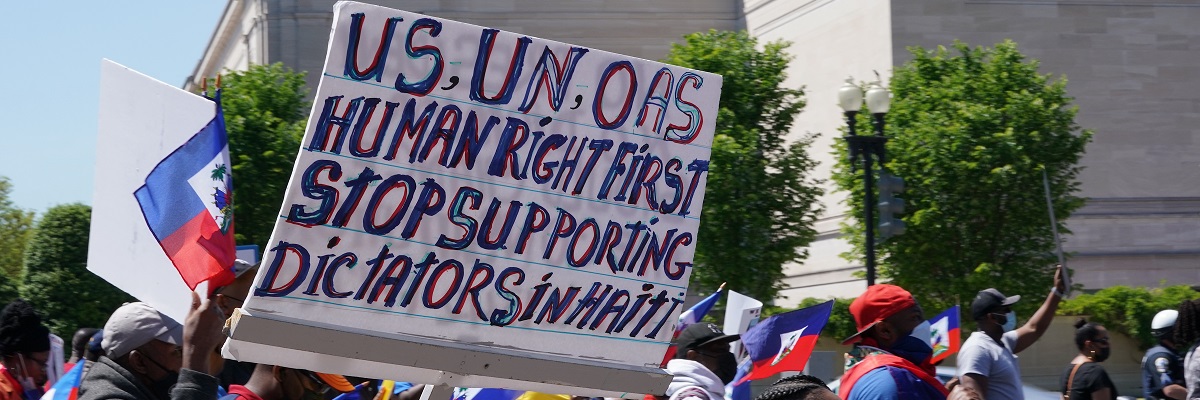Diplomacy
Haiti Mission Lacks Interlocutor Plus Peruvian Congress Purges Top Judges

Image Source : Shutterstock
Subscribe to our weekly newsletters for free
If you want to subscribe to World & New World Newsletter, please enter
your e-mail
Diplomacy

Image Source : Shutterstock
First Published in: Mar.12,2024
Mar.29, 2024
No interlocutor for Haiti mission’s international troops and Peru’s “pact of the corrupt” is succeeding where Guatemala’s failed without international pressure. No interlocutor for Haiti mission’s international troops. Haiti’s acting Prime Minister Ariel Henry announced he will resign. The timeline for his resignation is still unclear—it depends on the appointment of a transitional presidential council, jointly proposed by the United States, the Caribbean Community, and Henry’s administration. Henry’s announcement comes less than two weeks after he and Kenyan President William Ruto agreed to send 1,000 Kenyan police officers to Haiti as part of a Kenya-led multinational security mission (MSS). The mission’s aim is to support Haiti’s overwhelmed and outgunned national police force, less than 10,000-strong. The Bahamas, Bangladesh, Benin, among others, may join their mission, potentially adding thousands more troops and police officers. And donor nations, including the United States, Canada, Germany, France and Guyana, have pledged hundreds of millions of dollars in support. Yet the response looks to be too late and too little. Kenya’s promise to send officers is still in doubt, as courts have blocked government plans for over six months, and opposition lawmakers may mount a fresh challenge. Donor financial pledges total less than half the UN’s estimated need. And even if the troops arrive, they may not have a functioning government to work with. As the international community dithered, the situation on the ground deteriorated. Gangs now control over 80 percent of the capital, Port-au-Prince, and have attacked police stations, a port, Port-Au-Prince’s international airport, and two prisons, releasing some four thousand inmates. With Henry having agreed to resign—but no new government currently in place—it’s unclear who can play the role of interlocutor for the MSS. Without stability, more Haitians will flee. Already, over 126,000 Haitians have arrived as part of the Biden administration’s new humanitarian parole program that allows them to come and work for two years, outnumbering tens of thousands of Cuban, Nicaraguan, and Venezuelan migrants that also qualify. Mexico received more than 40,000 Haitian asylum requests in 2023 alone. And more look to join the hundreds of thousands of Haitians living across the Western Hemisphere if the Haitian state fails. Peru’s “pact of the corrupt” is succeeding where Guatemala’s failed without international pressure. Last year in Guatemala, an incongruous coalition of lawmakers from different parties earned the nickname the “pact of the corrupt” as they joined forces to erode the rule of law and overturn election results. Thanks in large part to sustained international pressure, including targeted U.S. sanctions against nearly 300 lawmakers, Guatemala’s “pact” failed to keep President Bernardo Arévalo, an anti-corruption reformer, from taking office. A group of far-right and far-left Peruvian lawmakers is conducting a similar move, passing laws to reduce judicial independence and undermine conditions for free and fair elections. On March 7, Peru’s “pact” fired two of the seven top magistrates from the National Justice Board, which names prosecutors and judges and helps choose election authorities. This could enable lawmakers to influence the selection of election authorities next year in the run-up to Peru’s 2026 general elections by threatening further purges. Last year, a coordinated joint statement from U.S., EU, and Latin American embassies in Peru forced lawmakers to back down from firing the National Justice Board magistrates. But this time around, similar democracy eroding moves triggered less unified international pushback. Senators Tim Kaine and Ben Cardin released statements in defense of the National Justice Board, and the State Department’s global anti-corruption coordinator met with the magistrates before the ouster. That could help explain why Peru’s congress fell short of the votes it needed to suspend more magistrates, including the National Justice Board president. But without more coordination and the threat of targeted sanctions, Peru’s “pact of the corrupt” seems to have won this round.
First published in :

Shannon K. O'Neil is the vice president, deputy director of studies, and Nelson and David Rockefeller senior fellow for Latin America studies at the Council on Foreign Relations. She is an expert on global trade, supply chains, Mexico, Latin America, and democracy.

Will Freeman is a fellow for Latin America studies at the Council on Foreign Relations (CFR). His work focuses on the rule of law, corruption and organized crime in Latin America, as well as U.S.-Latin America relations. His writing has appeared in Foreign Affairs, the New York Times, the Economist, the Journal of Democracy, the Washington Post, and Americas Quarterly, where he writes a monthly column.
Unlock articles by signing up or logging in.
Become a member for unrestricted reading!